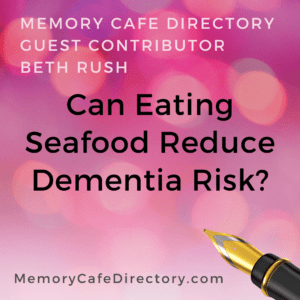Memory Cafe Directory posts and/or links to retailers can be advertising, sponsored, or affiliate links. We may earn a small commission from them. Thank you.
Families often have health histories that potentially affect each individual’s future. Genetics can make you more likely to develop specific conditions, like dementia or Alzheimer’s. Although you can’t reprogram your genetic code, you can make positive lifestyle changes like eating more seafood to minimize the possibility of receiving specific diagnoses.
Why do people think eating seafood reduces dementia risks? Does omega-3 help prevent Alzheimer’s? If you’re a caregiver for an aging person, here is a look at why this dietary change could help improve your and their brain health.
What’s So Important About Seafood?
Of all the available foods you could eat, why is seafood so crucial for people with a family history of dementia? It all comes down to fatty acids. Certain types of seafood contain fatty acids called omega-3s, like:
- Salmon
- Shrimp
- Mackerel
When you eat food high in fatty acids, the brain absorbs the omega-3s to nourish its cells and promote higher cognitive function. This can be an essential tool in maintaining neurological wellness.
Is Low Omega-3 and Dementia Linked?
If your genetics make you more likely to develop memory-related conditions, eating a diet high in omega-3s may prevent dementia from occurring early in your life. When someone consumes seafood or another meal high in fatty acids, the brain absorbs and uses them to strengthen the person’s cells.
When the cells become stronger and function more efficiently with the help of fatty acids, the brain continues operating at peak condition. Research shows that in addition to preventing dementia, eating more omega-3s can improve a woman’s overall cognitive function if they consume them daily.
Does Omega-3 Help Prevent Alzheimer’s?
Dementia and Alzheimer’s are closely related. Someone genetically predisposed to dementia may also eventually have Alzheimer’s and vice versa. This neurological disease happens when proteins build up on the brain like plaque. As it develops and affects a person’s memory or physical abilities, they may gain the secondary diagnosis of dementia.
Doctors use the diagnosis of dementia as an umbrella category. Many conditions affecting memory are the first sign that a person will also receive a dementia diagnosis later on.
When you eat omega-3s to improve cognitive functions, they also help prevent Alzheimer’s by ensuring that brain cells don’t slow down and lead to protein plaque buildup.
Should People Eat Omega-3s to Reduce Dementia Risk?
People can always consider adding more seafood to their diet to reduce their risk of dementia or other memory-related conditions. If you’re a caregiver wondering if it’s the right thing to do for your family’s health, you should check with their doctor regarding any preexisting health conditions or allergies.
Along with helpful lifestyle changes like becoming more active to increase brain activity and reduce risk, consuming more omega-3s can be an excellent way to make a dementia diagnosis less likely. However, you can always combine it with other advice presented by their primary care physician.

Photo by Adrien Sala on Unsplash
Ways to Enjoy More Seafood
Now that you’ve learned more about how omega-3s help prevent Alzheimer’s and dementia, check out a few ways you and who you care for can eat more of them without compromising time or budget.
1 Eat More Salads
When people start eating seafood, they often begin by putting it on salads. Fresh salmon or mackerel on a bed of lettuce with veggies and cheese can be delicious, but you can get the same omega-3s by spreading canned fish on your salads. It’s the perfect alternative for seafood lovers on a budget.
2 Swap Your Taco Meats
Your family may be one of the many who eat Mexican food regularly. Whenever possible, swap your taco or burrito meats with seafood. Shrimp or fish tacos are popular already, so they’ll be on most menus if you’re out to eat. They’re also easy to recreate at home with whatever seafood you have on hand.
3 Make Fish Patties
Tuna patties are simple to fry on the stove, in the oven or with an air fryer. Mix tuna or your preferred canned seafood with at least one egg and some breading. The breading and egg will bind it together so you can enjoy a burger-sized patty on a bun or with your favorite cookout sides.
If you or your ward are gluten-sensitive or have an allergy, you can always use almond or gluten-free flour as your breading. As long as the ingredients absorb the whisked egg, your patties will hold together without upsetting your digestive system.
4 Create Seafood Mac and Cheese
Not sure if they’ll like seafood? Marry it with mac and cheese for the ultimate flavor combination. You can make whatever oven-baked mac and cheese recipe you already love and add chopped lobster. Bake it long enough to cook the meat and you’ll get all the omega-3s you need when you’re craving comfort food.
5 Try Marinated Fish Filets
There are many types of fish filets available at grocery stores. Visit your local store to see which marinated products are waiting in the seafood aisle. You could try salmon marinated in butter and seasonings or cod in a lemon dill sauce. It’s an excellent resource for someone new to cooking and unsure where to start with their culinary seafood adventures.
6 Air Fry Your Seafood
Investing in an air fryer will change how you approach daily cooking. Along with frying their favorite foods in a much healthier way, you can also use it for cooking seafood. Coat lobster bites in breading and fry them until they’re deliciously crispy. Bake fish sticks in your air fryer or toast salmon filets until they fall apart at your fork.
There are many ways to use an air fryer to make creative or traditional recipes. Using one to explore seafood meals will make it much easier to take care of you and your loved one’s health and try new things.
Consider Eating Seafood to Reduce Dementia Risk
Eating more omega-3s can reduce dementia risk along with any other conditions that affect memory. Nourishing the brain is vital, so talk with your loved one’s doctor about adding more seafood to their diet. With support, you and them could start enjoying tasty dishes promoting brain health without changing your lifestyle or budget.
About the Author

Beth Rush
Beth Rush
Beth Rush is the Managing Editor and Content Manager at Body+Mind.
Body+Mind features articles about diet, fitness, mental health, parenting and health care.
Become a Contributor!
 Do you want to be a Memory Cafe Directory contributor? If you have helpful information to share with our community, read about the guidelines, then get in touch to discuss what you have to offer.
Do you want to be a Memory Cafe Directory contributor? If you have helpful information to share with our community, read about the guidelines, then get in touch to discuss what you have to offer.
Thank you.





